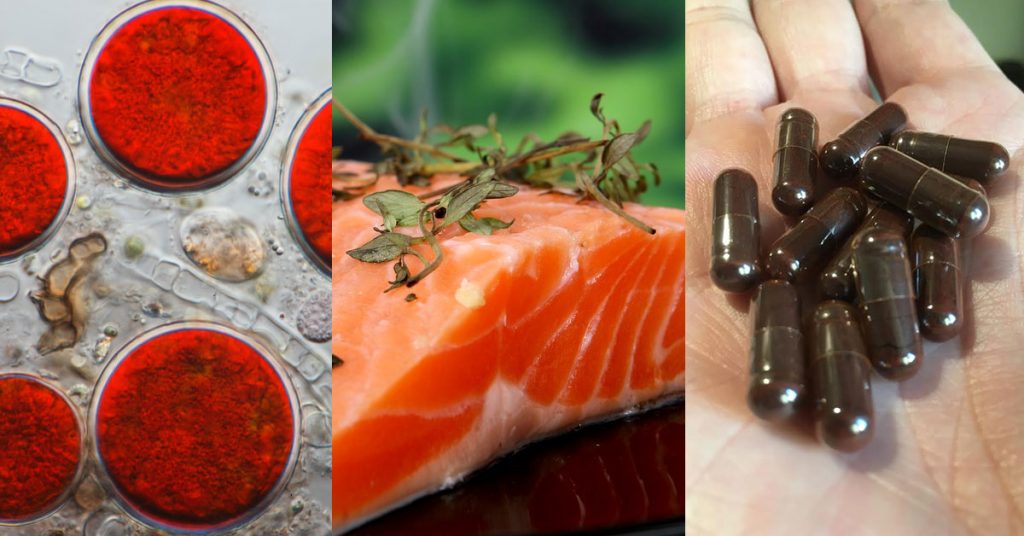What is Astaxanthin?
Astaxanthin (pronounced “asta-ZAN-thin”) is a naturally occurring carotenoid that comes from two primary sources: microalgae and sea creatures that consume microalgae. Astaxanthin is the substance that gives species their unique red-pinkish colour (such as shrimp, salmon, flamingos etc). This carotenoid is a powerful antioxidant and an anti-inflammatory compound which means it has many health benefits
Carotenoids are a group of plant pigments found in many plants, algae, and bacteria. They are distinguished by their orange, yellow, and red pigments. Astaxanthins are the “king” of carotenoids which means that it is one of the most beneficial carotenoids. Beta-carotene is another very beneficial carotenoid that is found mostly in carrots, however, astaxanthin is 50 times more powerful and beneficial than beta-carotene.
Where does Astaxanthin come from?
Natural astaxanthin is produced naturally in microalgae, fungi, and bacteria, and the aquatic creatures that eat algae. Some of the common naturally occuring sources of astaxanthin include sockeye salmon, red trout, lobster, shrimp, crab, krill etc.
The problem is that these sources only contain limited amounts of astaxanthin so a dietary supplement is beneficial for individuals looking to incorporate more astaxanthin into their diet.
Benefits of Astaxanthin
1)Reduces Oxidative Stress.Oxidative stress is an imbalance in the body if there are not enough antioxidants available. Adequate levels of antioxidants are needed to prevent stress and inflammation in the body and astaxanthin can be a great supplement to help prevent it. Furthermore, astaxanthin is shown to lower oxidative stress in obese individuals and smokers.
2)Reduces Inflammation.Astaxanthin has major anti-inflammatory properties and is known to inhibit the activity of inflammation-causing compounds. Since astaxanthin can travel throughout the body, it can target high-stress areas, such as the heart and brain. High levels of inflammation in the body is known to fuel conditions such as heart disease and Alzheimer’s disease which can be prevented by consuming astaxanthin.
3) Improves Heart Health.This antioxidant rich compound helps to maintain normal blood levels, LDL, HDL, and triglyceride levels. Astaxanthin helps keep blood fat levels at a normal range by improving blood flow and reducing fatty acids in the blood.
4)Improves Eye Vision.Astaxanthin protects the eyes from light-induced damage. Astaxanthin helps to prevent the most common eye diseases, such as age-related macular degeneration (AMD), glaucoma and eye strain. The human eye has molecules that are closely related to astaxanthin. Studies have shown that 6 mg per day of astaxanthin can help reduce eye dryness, tiredness, and blurred vision.
5)Protects the Brain and the Nervous System.Astaxanthin has a proven impact on the brain. It has the potential of slowing cognitive decline from brain aging, protects the brain cells from damage from various toxins, and improves brain blood flow and memory. A study on human cells found that astaxanthin reduced brain cell death by lowering the oxidative stress that is brought to the brain.
6)Lowers Risk for Diabetes.Astaxanthin lowers high blood sugar levels and oxidative stress which are common indicators of diabetes. It can improve sugar metabolism in the body to help prevent the risk for diabetes.
Overall, consuming healthy levels of astaxanthin helps support a healthy body with its anti-inflammatory and antioxidant properties. Make sure to incorporate astaxanthin dietary supplement into your diet to benefit from its incredible properties

